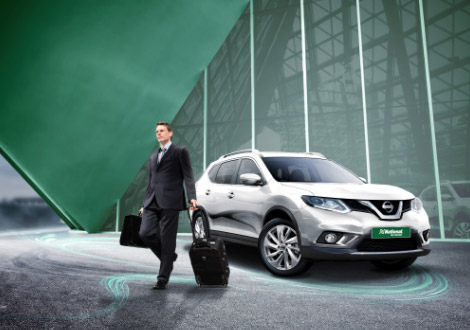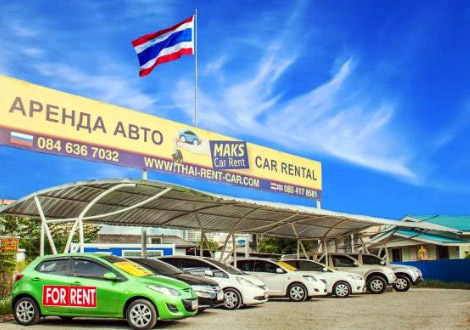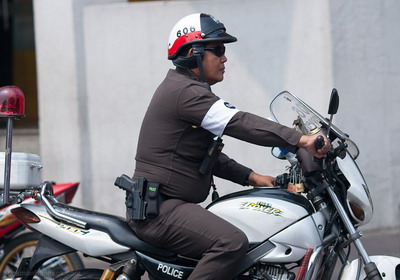 Rent a car in Pattaya
Rent a car in Pattaya
Renting a car is one of best way to get around Pattaya and to explore the surrounding area in absolute freedom. In Pattaya downtown and at U-Tapao International Airport it is possible to book in advance a small compact car for less than 1,000 baht per day, thus avoiding the annoying daily bargaining with the taxi drivers. However, driving in Pattaya might not be an ideal holiday as the traffic in the downtown can be very chaotic especially during the rush hours, weekends or long weekend holidays of Bangkok residents.
Tips - The road network around Pattaya is generally in good condition with road signs in Thai and English. When it starts to rain, moderate the speed even further, the sand and the dust makes the road surface slippery as ice. However, it is not road conditions that cause problems but road users. Thais are unpredictable drivers, while many have good driving skills and are accurate drivers many others aren't and do not respect the basic road rules. There will be drivers who drive on the wrong side of the road, overtake on the inside or make inversions without indicating. Some Thais, as well as a few tourists themselves, drive at speeds most suitable for racing drivers while others drive too slowly hindering traffic. To avoid problems, you just follow two simple rules: drive slowly and carefully.

Rent a car in Pattaya - Some of most prestigious international and Thai car rental brands have offices in Pattaya downtown such as Avis, Budget, Hertz, National and Thai Rent A car. In addition to these, there are a few car rental service desks in the terminal of U-Tapao Rayong-Pattaya International Airport, like Avis, Hetrz and Thai Rent A car. All these reliable companies offer a good range of vehicles and full insurance with the convenient opportunity to return the car in a city different than delivery. Rental rates in Thailand are rather cheap compared to Western standards and vary according the season, the company and car model you choose. By booking online in advance, you will pay from a minimum of 900 Baht to a maximum of 1,200 Baht per day for a small compact car such as a Toyota Yaris, 1,000 to 1,400 Baht for a slightly larger Toyota Vios, 1,400 to 2,000 Baht for a sedan like a Toyota Altis, and 2,400 to 3,400 Baht for a large SUV. Long term rental is more reasonable. All cars are equipped with air conditioning and automatic transmission. Whether you book online or rent directly at the airport, for the delivery of car you must present your passport, driving license and a credit card for both payment and warranty.
Local rental companies - Alternatively, if you choose to rent a car form a local private company, only use reputable companies avoiding the roadside renters as scams are not unusual in Pattaya. You will find these improvised renters parked along the beachfront roads offering mostly fun jeeps, but also compact cars and sedans, with inviting "CAR FOR RENT" signals. Unfortunately, most of them do not have rental licenses, they claim to include full insurance, but in reality they have the bare minimum government insurance. Another problem with beach roadside renters is they want to keep your passport as a guarantee for the vehicle. Often they claim non-existent damage to the vehicle by your fault, so they will hold the passport until you pay extra for repairs. Reliable local rental companies offer a good range of vehicles and the full insurance. Prices vary by season, roughly you will pay from 1,000 to 1,400 Baht per day for a small Toyota Vios and from 2,200 to 3,400 Baht for a large SUV. Long term rental is more reasonable. Usually they ask for your passport as a guarantee, but not always, you try to give them a photocopy instead, plus a cash deposit eventually, as you should never give up your passport under any circumstances.

Fuel - The main vehicle fuels in Thailand are benzine 95, which is unleaded fuel, gasohol 95 and 91, and diesel. The old benzine 91 octanes has been phased out, as Thailand aims to get more vehicles running on gasohol, which is 80% gasoline and 20% ethanol. The numbers 91 and 95 refer to the octane output of the fuel. Vehicles sold in Thailand since 2006 have been designed to use benzine 95 or gasohol 95, both cost about 34-35 per litre from petrol stations, but you can also use gasohol 91 although the engine delivers less power. Designed to use benzine 95, older vehicles can use gasohol 95, but sustained use can lead to the premature deterioration of rubber parts in the engine. If you notice that the engine is not running smoothly, it may also be a good idea to try a different fuel station, as the quality is not the same everywhere. There are plenty of petrol stations around Pattaya. In addition to major fuel stations, there are also roadside vendors selling fuel from hand-operated pumps, as well as endless small kiosks selling fuel-filled whiskey bottles. However, these kiosks must be your last resource only if your car is running out of fuel, as the bottles they sell for 40 or 50 baht are only 750 cl.
Driving Licence & Traffic Fines - To drive cars in Thailand, foreigners must hold a valid driving license. That means: a Thai driving license, a license from a neighbouring country like Cambodia, Laos and Malaysia, or an International Driving Permit, IDP, released according to the 1949 Geneva Convention on Road Traffic with a validity of three months. Note that: 1 - IDP according to the 1968 Vienna Convention on Road Traffic valid for one year is tolerated but, in the event of an accident, you may have some problems with the Thai Police. 2 - Western driving licenses are no longer tolerated by the Thai Police. You can easily obtain a valid IDP in your home country, while Thai driving licenses are only available to foreigners if they have a Non-immigrant Visa, i.e. business or long term visa. Driving a car without a valid license in Thailand is a traffic violation that involves a fine of 400 baht and will also invalidate the vehicle insurance. Paying the fine in Thailand usually involves leaving your car or your passport with the police while you go to the nearest Police Station to make the payment. You can then return with the receipt of payment and continue your journey. Thai Police conduct random road checks and if it is found to be committing a road violation will be subject to a fine that you can pay at the checkpoint.

The fines range from 200 to 2000 baht, depending on the offense. In Pattaya, Police checkpoints are common. Normally, they control license plate, owner’s registration, vehicle insurance, broken lights and above all your passport and driving license, and if you do not produce it, they can stop you until one is produced. In Thailand driving is on the left, overtaking is on the right and precedence, unless otherwise indicated, must be given to the right. Seatbelts are mandatory in front seats only, child car seats are optional. Speed limits by law around Pattaya are: 80 km/h within municipal areas and 90 km/h in all other areas. Drivers should also be aware that much harsher penalties for drunk driving were introduced last year. Under the new laws, the BAC limit for professional and drivers under 24 years old is zero, and the legal BAC limit for all other drivers is 0.05%. The new penalties for drunk driving are as follows: 1 - Drunk driving: Up to one year imprisonment or a fine of 5,000 to 20,000 baht or both, and driver’s license suspended for six months. 2 - Drunk driving causing bodily or mental harm to others: One to five years imprisonment or a fine of 20,000 to 100,000 baht or both, and driver’s license suspended for up to one year. 3 - Drunk driving causing serious injury to others: Two to six years imprisonment or a fine of 40,000 to 120,000 baht or both, and driver’s license suspended for up to two years. 4 - Drunk driving causing death: Three to 10 years imprisonment and a fine of 60,000 to 200,000 baht and your driver’s license will be cancelled. Whether you will be allowed to apply for a driver’s license again during your lifetime is up to the court.
Find the best Hotel in Pattaya at "Lowest Price"
Back to Pattaya

















